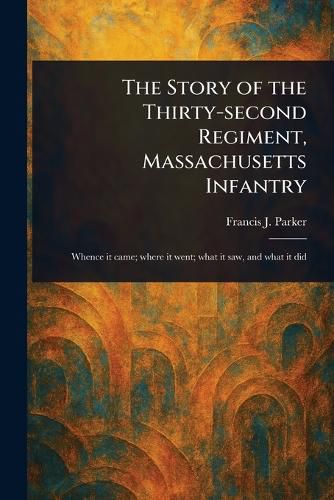Readings Newsletter
Become a Readings Member to make your shopping experience even easier.
Sign in or sign up for free!
You’re not far away from qualifying for FREE standard shipping within Australia
You’ve qualified for FREE standard shipping within Australia
The cart is loading…






This title is printed to order. This book may have been self-published. If so, we cannot guarantee the quality of the content. In the main most books will have gone through the editing process however some may not. We therefore suggest that you be aware of this before ordering this book. If in doubt check either the author or publisher’s details as we are unable to accept any returns unless they are faulty. Please contact us if you have any questions.
"The Story of the Thirty-second Regiment, Massachusetts Infantry: Whence it came; where it went; what it saw, and what it did" offers a meticulously researched account of one regiment's experience during the American Civil War. Penned by Francis J. Parker, this detailed history chronicles the Thirty-second Regiment of Massachusetts Infantry from its formation to its disbandment.
A valuable resource for those interested in military history and the role of Massachusetts in the Union Army, the book explores the regiment's engagements, movements, and the lives of the soldiers who served. It provides insight into the everyday realities of warfare and the challenges faced by both officers and enlisted men. As a regimental history, it offers a focused lens through which to examine the broader context of the Civil War. This enduring record serves as a testament to the dedication and sacrifice of the Thirty-second Regiment, providing a crucial contribution to the historical understanding of the conflict.
This work has been selected by scholars as being culturally important, and is part of the knowledge base of civilization as we know it.
This work is in the public domain in the United States of America, and possibly other nations. Within the United States, you may freely copy and distribute this work, as no entity (individual or corporate) has a copyright on the body of the work.
Scholars believe, and we concur, that this work is important enough to be preserved, reproduced, and made generally available to the public. We appreciate your support of the preservation process, and thank you for being an important part of keeping this knowledge alive and relevant.
$9.00 standard shipping within Australia
FREE standard shipping within Australia for orders over $100.00
Express & International shipping calculated at checkout
This title is printed to order. This book may have been self-published. If so, we cannot guarantee the quality of the content. In the main most books will have gone through the editing process however some may not. We therefore suggest that you be aware of this before ordering this book. If in doubt check either the author or publisher’s details as we are unable to accept any returns unless they are faulty. Please contact us if you have any questions.
"The Story of the Thirty-second Regiment, Massachusetts Infantry: Whence it came; where it went; what it saw, and what it did" offers a meticulously researched account of one regiment's experience during the American Civil War. Penned by Francis J. Parker, this detailed history chronicles the Thirty-second Regiment of Massachusetts Infantry from its formation to its disbandment.
A valuable resource for those interested in military history and the role of Massachusetts in the Union Army, the book explores the regiment's engagements, movements, and the lives of the soldiers who served. It provides insight into the everyday realities of warfare and the challenges faced by both officers and enlisted men. As a regimental history, it offers a focused lens through which to examine the broader context of the Civil War. This enduring record serves as a testament to the dedication and sacrifice of the Thirty-second Regiment, providing a crucial contribution to the historical understanding of the conflict.
This work has been selected by scholars as being culturally important, and is part of the knowledge base of civilization as we know it.
This work is in the public domain in the United States of America, and possibly other nations. Within the United States, you may freely copy and distribute this work, as no entity (individual or corporate) has a copyright on the body of the work.
Scholars believe, and we concur, that this work is important enough to be preserved, reproduced, and made generally available to the public. We appreciate your support of the preservation process, and thank you for being an important part of keeping this knowledge alive and relevant.